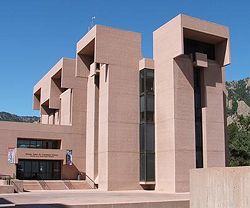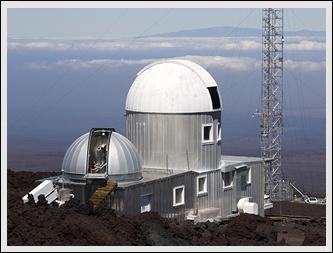National Center for Atmospheric Research
The National Center for Atmospheric Research (NCAR) is a non-governmental U.S.-based institute whose stated mission is "exploring and understanding our atmosphere and its interactions with the Sun, the oceans, the biosphere, and human society."
NCAR's flagship Mesa Laboratory is located in the outskirts of Boulder, Colorado, in a dramatic complex of buildings designed by architect I. M. Pei. The site is maintained as a nature preserve.
The Mesa Laboratory includes science exhibits, an educational resource center. a library, and art galleries all open to the general public.
Locations
NCAR is headquartered in Boulder, Colorado, with most activity taking place on three campuses:
- NCAR Mesa Laboratory in the southwest outskirts of Boulder
- Foothills Laboratory and Center Green Campus in northeast Boulder
- Research Aviation Facility at the Jefferson County Airport in Broomfield, Colorado
In addition, NCAR's High Altitude Observatory operates the Mauna Loa Solar Observatory in Hilo, Hawaii
Ancillary activities take place elsewhere in Boulder, in Washington, D.C. and in about 15 states other than Colorado.
NCAR research areas
NCAR has six primary research areas:
- Climate: The study of regional climate and the past, present and future global climate and changes in climate.
- Societal impacts: The effects of weather and climate on society and national security.
- Meteorology and weather: Weather forecasting and predicting, the study of severe storms, the study of the physical processes of the atmosphere, and training of meteorologists.
- Air pollution and atmospheric chemistry: Studying chemical processes in the atmosphere, ozone, and air pollution (including plume dispersion and tracking).
- The whole Earth system: Research into the effect of oceans and of land use on weather and climate, the water cycle, and the cryosphere.
- The Sun and space weather: Studies of space weather, the effect of the sun on Earth's weather and climate, and operating a solar observatory.
Personnel and annual expenditures
NCAR has a total staff (as of February 2011) of approximately 990, including research, technical and support people.[1]
The staff includes about 341 scientists, 180 engineers and 37 post-doctoral Fellows.[1]
NCAR's primary sponsor is the National Science Foundation (NSF) and it is designated as an NSF Federally Funded Research and Development Center. The total expenditures for the fiscal year of 2010 was $179,000,000. Approximately 95% of NCAR's funding comes from the federal government but it is not a federal agency and NCAR's staff are not part of the federal personnel system. [1]
Organization
NCAR is one of the major parts of the University Corporation for Atmospheric Research (UCAR) which is a not-for-profit consortium of universities that grant Ph.D.s in fields related to atmospheric science.
NCAR is governed by a directorate headed by a director and an assistant director. The directorate includes:[2]
- A budget and planning office
- A research relationship office
- An advanced studies program office
- The NCAR library
The four research laboratories of the NCAR are:
- The Computational & Systems Information Laboratory (CSIL)
- The Earth Observatory Laboratory (EOL)
- The High Altitude Observatory (HAO)
- The NCAR Earth System Laboratory(NESL)
- The Research Applications Laboratory (RAL)
More detailed organization charts are available on the Internet.[2][3]
References
- ↑ Jump up to: 1.0 1.1 1.2 Quick Facts about NCAR, UCAR, and UOP
- ↑ Jump up to: 2.0 2.1 NCAR Organization Chart (Scroll down to see chart)
- ↑ UCAR Organization Chart

